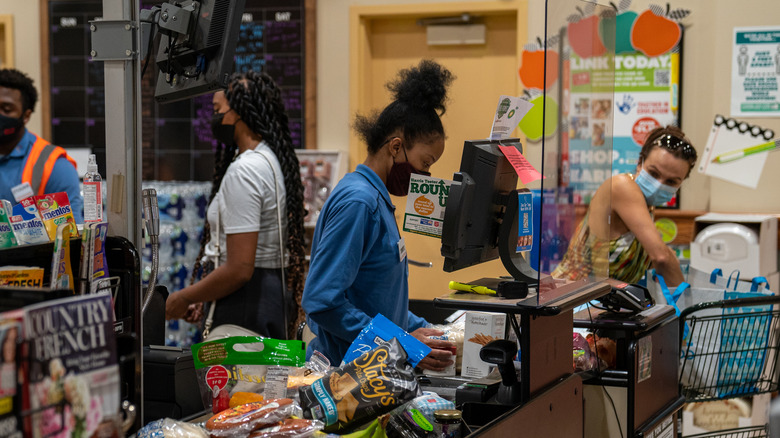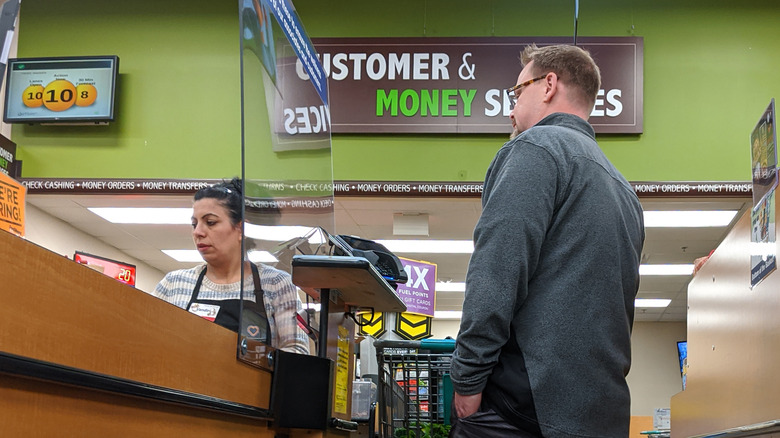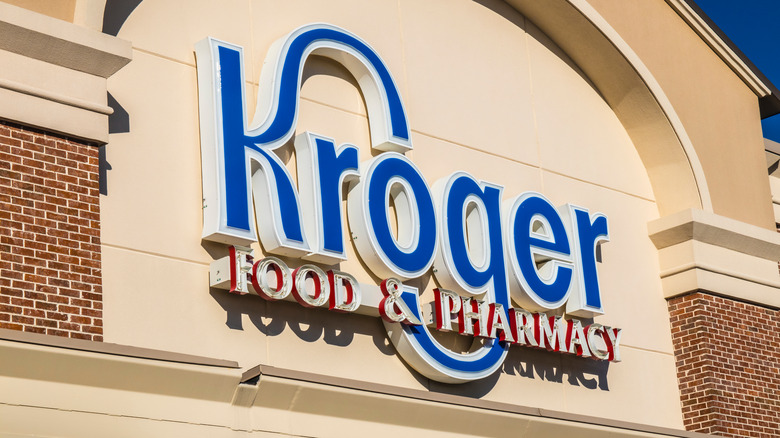Recent Study Reveals Sad Fact About Grocery Workers And Food Insecurity
Life looked like it was poised to return to normal back during the Spring of 2021. COVID's Delta variant had yet to make an appearance, and signs were pointing to a post-pandemic revival of some kind, particularly within the retail sector. But instead of flocking back to work, many workers in the U.S. chose to head for the exit in what has become known as "The Great Resignation."
In April of 2021 alone, an estimated 649,000 retail workers quit their jobs in a record-breaking number of resignations for one month since the Labor Department began keeping score (via The Washington Post). And in case they were wondering, employers didn't have to look far for the reasons their job vacancies weren't being filled. In a survey conducted by software company Axonify, employees cited burnout, poor compensation, and lack of appreciation from management and peers. In a a telling datapoint, just over 67% of frontline workers said they were satisfied with the pandemic support their employers gave them, against nearly 86% of office workers who were asked the same thing.
A recent survey of Kroger employees published by the Economic Roundtable highlights the sad reality for many grocery store workers, who are still dealing with these same issues today.
A survey reveals the grim reality of grocery workers
A white paper published in January 2022 by the Economic Roundtable on workers at supermarket chain store owner Kroger (which owns stores like Ralph's, Fred Meyer, and others) sheds light on why working at a grocery chain might not be that much better than not working at all. The paper is a result of a survey conducted across three regions — Washington state's Puget Sound area, Colorado, and Southern California — where Kroger employs more than 36,000 persons. Over 10,000 workers opted to take part in the survey, and in doing so, they revealed a shocking truth: over 75% of supermarket workers cannot afford healthy food; run out of food before the end of the month; skip meals and go hungry; and are unable to give their children food or other essentials. Food insecurity for Kroger employees is seven times higher than the national average. Given that these workers are paid to feed everyone else, they could be more than figuratively starving in the midst of plenty.
That's not all. Where working in a supermarket was once a ticket to the middle class, workers now subsist on poverty wages. To give workers a living wage, Kroger would need to pay $45,760 annually — but the average pay is only $29,655. When adjusted for inflation, Economic Roundtable found that wages actually shrank by as much as 22% since 1990.
Grocery frontline workers have few options
Given the situation, the choice, as far as a retail worker seemed to be concerned, is binary: stick it out or seek greener pastures. As Rutgers University labor studies professor Rebecca Givan put it, "We're seeing a wider understanding that these were never good jobs and they were never livable jobs. In many cases, the pay is below a living wage and the hours are inconsistent and insufficient. If anything, the pandemic has made retail jobs even less sustainable than they already were" (via The Washington Post).
To be fair, "The Great Resignation" might have gotten Kroger thinking. Job site Indeed reported average hourly pay at Kroger includes $9.63 for a cashier, $10.97 for a produce clerk, $10.75 for a bakery clerk, $11.57 for a grocery clerk, and $11.16 for a deli associate; and Payscale also reported that the average hourly rate for Kroger employees sat at $12.17 an hour, depending on what you did. The latest want ads from the grocery chain seem to show something of a sea change for the supermarket giant: Kroger's latest job listing on Indeed now reflects wages set between $15.40 to $22 an hour depending on the task and location, which reflects a Washington Post report that the average pay at restaurants and grocery stores broke $15 an hour for the first time ever for as much as 80% of workers in the country.
Unfortunately for grocery store employees, that $15 minimum still falls short of the $22 hour average the Economic Roundtable says it will take to make ends meet for a full-time employee.


